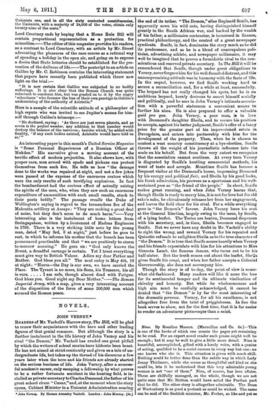NOVELS.
JOHN VERNEY.*
READERS of Mr. Vacbell's Harrow story, The Hill, will be glad to renew their acquaintance with the hero and other leading figures of that genial romance. But although the story is a further instalment in the life history of John Verney and his rival "the Demon," Mr. Vachell has evaded one great pitfall by which the writers of school stories have hitherto been beset. He has not aimed at strict continuity and given us a tale of un- dergraduate life, but takes up the thread of his discourse a few years later when the hero and his friends are already started on the serious business of life. John Verney, after a success- ful academic career, only escaping a fellowship by what proves to be a rather fortunate accident in the hunting field, is in- stalled as private secretary to Charles Desmond, the father of his great school chum " Cmsar,"and, at the moment when the story opens, Cabinet Minister in a Unionist Administration nearing ' John Varney. By Horace Anneidey Waal. Loudon : John Murray. 084 the end of its tether. " The Demon," alias Reginald Scaife, bas apparently sown his wild oats, having distinguished himself greatly in the South African war, and backed by the wealth of his father, a millionaire contractor, is immersed in finance, practical philanthropy, and the control of a great newspaper syndicate. Scaife, in fact, dominates the story much as he did its predecessor, and as he is a blend of unscrupulous poli- tician, advertising athlete, and newspaper millionaire, it may well be imagined that he proves a formidable rival to the con- scientious and reserved private secretary. In The Hill it will be remembered that Scaife, though under great obligations to Verney, neverforgave him for his well-founded distrust, and this uncompromising attitude was in harmony with the facts of life. In the sequel, however, we find Scaife working hard to secure a reconciliation and, for a while at least, successfully. The leopard has not really changed his spots, but he is an ambitious leopard, keenly desirous to assert himself sccially and politically, and he sees in John Verney's intimate associa- tion with a powerful statesman a convenient means to further his aims. He is also prepared to offer a valuable quid pro quo. John Verney, a poor man, is in love with Desmond's daughter Sheila, and to secure his position he accepts, against his better judgment, Scaife's offer of a fancy price for the greater part of his impoverished estate in Devonshire, and enters into partnership with him for the development of the property. Then, when he is chosen to contest a west country constituency at a bye-election, Scaife throws all the weight of his journalistic influence into the scale on his behalf. But from the very outset we recognise that the association cannot continue. At every turn Verney is disgusted by Scaife's hustling commercial methods, his want of taste and scruple. Meantime Scaife has become a frequent visitor at the Desmond's house, impressing Desmond by his energy and political flair, and Sheila by his good looks, his frank admiration, his prowess as a sportsman and his well- sustained pose as "the friend of the people." In short, Scaife makes great running, and when John Verney learns that, though Sheila is ready to marry him, it is not for love but for old sake's sake, he chivalrously releases her from her engagement, and leaves the field clear for his rival. For a while everything goes in " the Demon's " favour. John Verney loses his seat at the General Election, largely owing to the issue, by Scaife, of a lying leaflet. The Tories are beaten, Desmond dispenses with his secretary, and, in time, Sheila becomes engaged to Scaife. But we never have any doubt in Mr. Vachell's ability to right the wrong, and reward Verney for his repeated and Quixotic refusals to enlighten Sheila as to the true character of " the Demon." It is true that Scaife scores heavily when Verney and his friends expostulate with him for his attentions to Miss Genesta Lamb, the famous dancer, who turns out to be his half-sister. But the truth comes out about the leaflet, She 4a gives Scaife his carve, and when her father accepts a Colonial Governorship, she does not accompany him.
Though the story is of to-day, the point of view is some- what old-fashioned. Many readers will like it none the less for its sentimental temper and its ultimate vindication of chivalry and honesty. But while its wholesomeness and high aim must be cordially acknowledged, it cannot be denied that " the Demon " is by far the most interesting of the dramatis persona?. Verney, for all his excellence, is not altogether free from the taint of priggishness. In fine the book serves to show, not for the first time, that it is far easier to render an adventurer• picturesque than a saint.










































 Previous page
Previous page